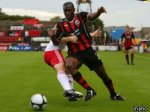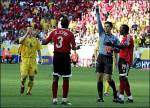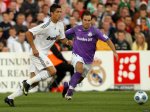Nearly Men, Yet Again
Champions League, 2nd Qualifying Round – 22nd July 2009
Bohemians: 0
Red Bull Salzburg: 1 (Jezek, 87)
(Red Bull win 2-1 on aggregate)
———————————————–

Joseph Ndo beats his marker against Red Bull Salzburg
So near, so far, so very League of Ireland. Bohemians came within three minutes of becoming only the second Irish club side to reach the final qualifying stage of the Champions League on Wednesday night, producing a hard-working and tactically astute performance that was cruelly undone by a late defensive lapse. In Jason Byrne, Glen Crowe and Cameroon’s Joseph Ndo, Bohs were able to boast three players with international experience as well as one who must be close to a first cap in Brian Murphy (watched from the stands by Ireland goalkeeping coach Alan Kelly), yet once again the best and brightest the League had to offer came up agonisingly short. Not since Shelbourne clashed with Deportivo in 2004 has an Irish side made it to the brink of the Champions League proper, although wins in recent years over the likes of NEC Nijmegen and Malmo, as well as draws against Dynamo Kyiv and Hertha Berlin, have counted as highlights amongst an otherwise queasy assortment of reversals.
Results like Wednesday’s tend to elicit reactions of either patronising head-patting (“sure isn’t it great to even get this far”) or bleakest despair (“thus far shall we go, and no further”). Each is understandable in its own right – yes, sandwiched between the twin titans of the GAA and the English Premiership, the dogged persistence of a functioning Irish club scene is an achievement in itself – and yes, Irish clubs, with their yo-yo finances and ill-advised patterns of investment, are often their own worst enemies. And yet recent history has shown small but significant steps towards progress that belie such fatalism. The initiative by ex-FAI chief Fran Rooney to scout the Nordic leagues for inspiration resulted in a rejigged season calendar which played through the summer months, thus sidestepping the chilling effect of winter rains on matchday attendances as well as stealing a march on European winter league rivals who could be caught cold in August qualifiers. The improvement that followed in Ireland’s UEFA coefficient, jumping from 40th to 30th in five years, the third biggest leap behind Russia and Romania, is surely no coincidence.

Ex-FAI CEO Fran Rooney
As with the national side, club aspirations will always be leavened with a stiff measure of realism. The likes of Bohemians, Pats and Cork City are all too aware that as long as their homegrown players are forced abroad to fulfil their potential, they will never be able to fulfil theirs. And yet through pragmatic moves in the transfer window, Irish clubs have been able to benefit from the experience and quality of League of Ireland alumni whose playing days in Britain are drawing to an end. Former internationals Curtis Fleming, Alan Moore, Joe Ó Cearúill and Colin Healy (since signed for Roy Keane’s Ipswich), to name but a few, all staged returns to the League of Ireland and played key roles in strong European runs for their respective clubs. Returned exiles are also enjoying some modestly fruitful stints at the management end – with Richard Sadlier appointee Jeff Kenna masterminding St Patrick’s Athletic’s victory over Valetta FC in the Europa League on Thursday night. Though small, the increasing number of returning Irish players with experience at a higher level has had knock-on effects, with team-mates benefitting from their big-match experience as well as boardrooms taking advantage of the draw of having an ex-international in the side. You could almost describe it as the footballing equivalent of a millionaire businessman returning to his hometown to ‘give something back’.

Avery John is sent off for Trinidad and Tobago at World Cup 2006
A strong contingent of foreign players is a prerequisite for any European league with aspirations of success, and the emergence of the foreign ‘cult hero’ at League of Ireland clubs has been a positive step in the evolution of a likeable club culture of cosmopolitan ‘quirkiness’. Following the example set by the great Charles Mbabazi Livingstone (St Pat’s and Uganda), Eric Lavine (Barbados) and Bohs’ Avery John who appeared for Trinidad and Tobago at World Cup 2006, the influx of eastern European and African immigrants from the Celtic Tiger years has been a boon to the League. Mindaugas Kalonas (who starred for Bohemians in 2008) has 31 caps for Lithuania, Bosnian striker Fahrudin Kuduzovic scored the opener in Cork City’s recent win over Ipswich, while Romauld Boco combines his prolific midfield duties at Sligo Rovers with captaining his native Benin in the African Cup of Nations. Add that to the most high-profile of the current crop, Joseph Ndo of Cameroon, and you have a pleasing cosmopolitan edge to old League rivalries. More importantly, the arrival of these players has resulted in improved fortunes on the pitch and a further step towards footballing ‘glasnost’ embracing other ways of doing things – although it hasn’t all been plain sailing. With the Irish playing pool curtailed in a sports market crowded by GAA and rugby, it is clear that the consolidation and expansion of scouting networks abroad will be crucial to the growth of the League.
The final point regarding the ‘re-positioning’ of the League is its trajectory in from the media fringes. The bigger club matches now enjoy weekly live coverage on RTÉ, as well as benefitting from the awareness raised by the excellent MOTD-esque ‘Monday Night Soccer’ hosted by Con Murphy. Aside from providing match highlights of the week’s fixtures, the show ranges from player profiles to more philosophical ruminations on the fortunes of the League and was well-placed to capitalise on the surge in interest that followed Shamrock Rovers v Real Madrid on Monday night. The timing, style and content of the programme are the product of good thinking at management level, ensuring a prime-time fix for football fans on a night where competition from Premiership and Champions League is scarce to none.

Ronaldo takes on Sean O'Connor of Shamrock Rovers
RTE analyst Tony O’Donoghue is one of the more knowledgeable voices in League of Ireland matters today, and his recent reflection that “the family of football, like the League of Ireland, shouldn’t be a narrow, closed grouping. The soccer church should be a broad one – open, honest, accountable and transparent” was as a pointed one. The influx of Irish exiles, former internationals and foreign players has reinvigorated the League which, allied to a more sensible ‘summer season’ schedule and improved media coverage, has started to yield the green shoots of tangible progress. While the Salzburg defeat will rankle, the progress of Derry City and St Pat’s to the next round of the Europa League will surely be balm to the wounds of another Champions League near-miss. The League is in increasingly rude health, and with continued smart planning and a willingness to learn from abroad it is not fanciful to expect that, given time, an Irish club can emulate what fellow small-nation sides BATE Borisov and Anorthosis Famagusta achieved last season: a breakthrough into the Champions League proper.
No trackbacks yet.